新概念英语第一册笔记-第19课
- 格式:docx
- 大小:12.76 KB
- 文档页数:2
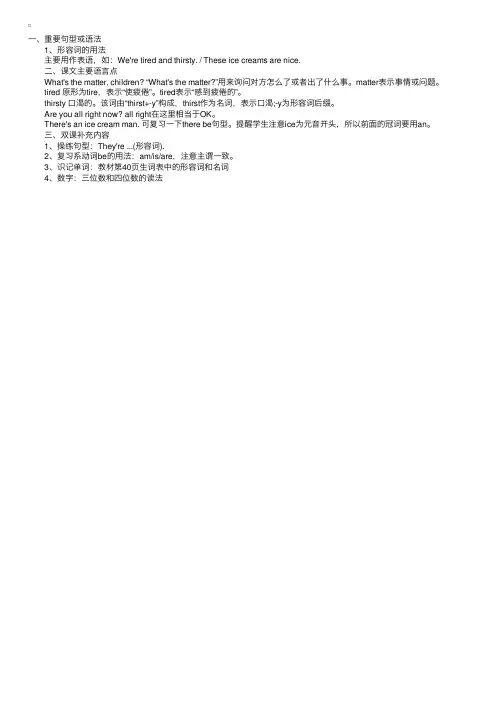
⼀、重要句型或语法
1、形容词的⽤法
主要⽤作表语,如:We're tired and thirsty. / These ice creams are nice.
⼆、课⽂主要语⾔点
What's the matter, children? “What's the matter?”⽤来询问对⽅怎么了或者出了什么事。
matter表⽰事情或问题。
tired 原形为tire,表⽰“使疲倦”。
tired表⽰“感到疲倦的”。
thirsty ⼝渴的。
该词由“thirst+-y”构成,thirst作为名词,表⽰⼝渴;-y为形容词后缀。
Are you all right now? all right在这⾥相当于OK。
There's an ice cream man. 可复习⼀下there be句型。
提醒学⽣注意ice为元⾳开头,所以前⾯的冠词要⽤an。
三、双课补充内容
1、操练句型:They're ...(形容词).
2、复习系动词be的⽤法:am/is/are,注意主谓⼀致。
3、识记单词:教材第40页⽣词表中的形容词和名词
4、数字:三位数和四位数的读法。
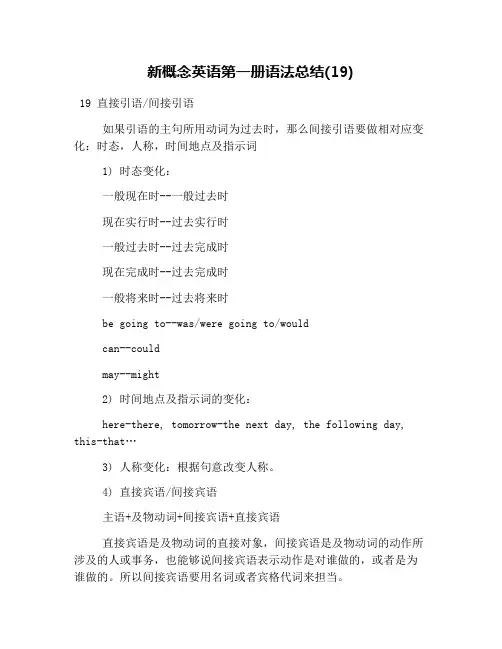
新概念英语第一册语法总结(19)
19 直接引语/间接引语
如果引语的主句所用动词为过去时,那么间接引语要做相对应变化:时态,人称,时间地点及指示词
1) 时态变化:
一般现在时--一般过去时
现在实行时--过去实行时
一般过去时--过去完成时
现在完成时--过去完成时
一般将来时--过去将来时
be going to--was/were going to/would
can--could
may--might
2) 时间地点及指示词的变化:
here-there, tomorrow-the next day, the following day, this-that…
3) 人称变化:根据句意改变人称。
4) 直接宾语/间接宾语
主语+及物动词+间接宾语+直接宾语
直接宾语是及物动词的直接对象,间接宾语是及物动词的动作所涉及的人或事务,也能够说间接宾语表示动作是对谁做的,或者是为谁做的。
所以间接宾语要用名词或者宾格代词来担当。
He gives me a book.
me间接宾语, a book直接宾语
直接宾语和间接宾语的位置调换时要加一个介词to或for 主语+及物动词+直接宾语+介词+间接宾语
Give me a book.
Give the book to me.
Send his a letter.
Send a letter to him.
Show him the new dress.
Show the new dress to him.。
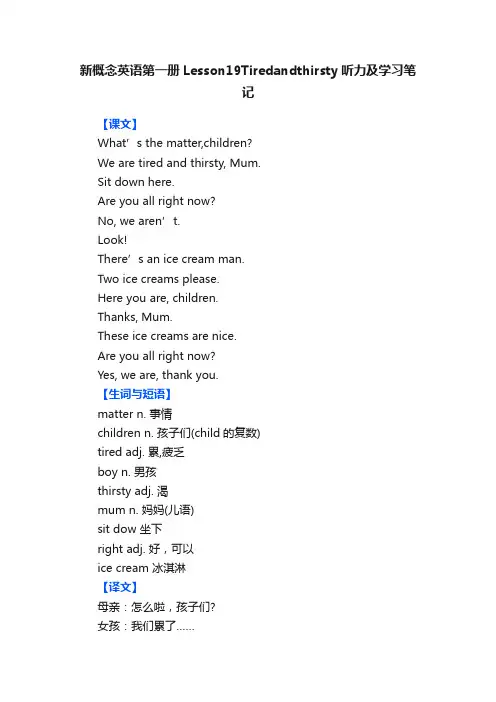
新概念英语第一册Lesson19Tiredandthirsty听力及学习笔记【课文】What’s the matter,children?We are tired and thirsty, Mum.Sit down here.Are you all right now?No, we aren’t.Look!There’s an ice cream man.Two ice creams please.Here you are, children.Thanks, Mum.These ice creams are nice.Are you all right now?Yes, we are, thank you.【生词与短语】matter n. 事情children n. 孩子们(child的复数)tired adj. 累,疲乏boy n. 男孩thirsty adj. 渴mum n. 妈妈(儿语)sit dow 坐下right adj. 好,可以ice cream 冰淇淋【译文】母亲:怎么啦,孩子们?女孩:我们累了……男孩:……口也渴,妈妈。
母亲:坐在这儿吧。
母亲:你们现在好些了吗?男孩:不,还没有。
母亲:瞧!有个卖冰淇淋的。
母亲:请拿两份冰淇淋。
母亲:拿着,孩子们。
孩子们:谢谢,妈妈。
女孩:这些冰淇淋真好吃。
母亲:你们现在好了吗?孩子们:是的,现在好了,谢谢您!【学习笔记】1.sit down 坐下,其反义词组为stand up,意为“站立”。
down的拓展:get down 趴下go down 沿着come down 下来kneel down 跪run down 跑下turn down 拒绝jump down 跳下去show down 显示下shut down 关闭slip down 滑倒fall down 倒了move down 向下talk down 贬低2.right n.右边;adj.对的,正确的right的拓展:all right 好吧Mr. Right 理想中的丈夫Miss. Right 理想中的妻子right now 现在right away 立刻right or wrong 不论对错3.look/see/watch辨析:look强调“看”的动作。
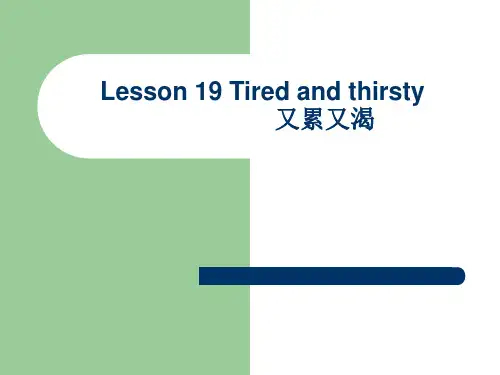
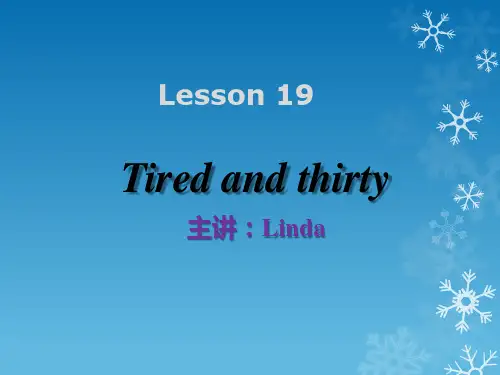
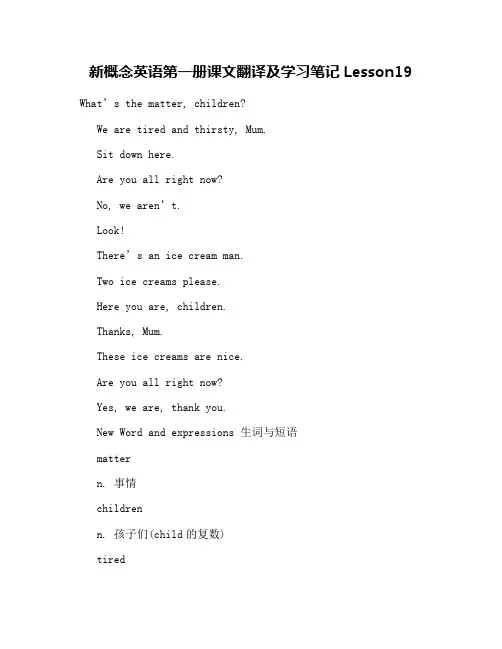
新概念英语第一册课文翻译及学习笔记Lesson19 What’s the matter, children?
We are tired and thirsty, Mum.
Sit down here.
Are you all right now?
No, we aren’t.
Look!
There’s an ice cream man.
Two ice creams please.
Here you are, children.
Thanks, Mum.
These ice creams are nice.
Are you all right now?
Yes, we are, thank you.
New Word and expressions 生词与短语
matter
n. 事情
children
n. 孩子们(child的复数)
tired
adj. 累,疲乏
boy
n. 男孩
thirsty
adj. 渴
Mum
n. 妈妈(儿语)
sit down
坐下
right
adj. 好,能够
ice cream
冰淇淋
本文参考译文
母亲:怎么啦,孩子们?
女孩:我们累了……
男孩:……口也渴,妈妈。
母亲:坐在这儿吧。
母亲:你们现在好些了吗?男孩:不,还没有。
母亲:瞧!有个卖冰淇淋的。
母亲:请拿两份冰淇淋。
母亲:拿着,孩子们。
孩子们:谢谢,妈妈。
女孩:这些冰淇淋真好吃。
母亲:你们现在好了吗?
孩子们:是的,现在好了,谢谢您!。
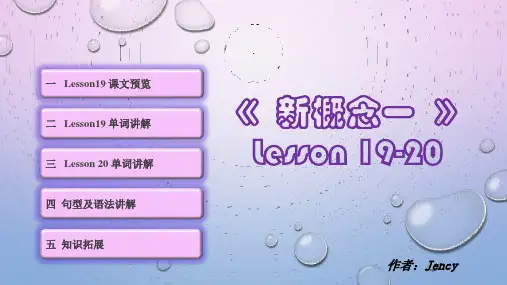
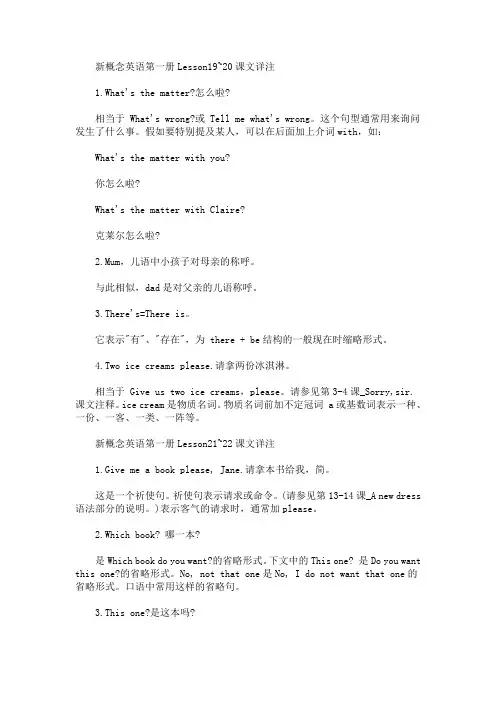
新概念英语第一册Lesson19~20课文详注1.What's the matter?怎么啦?相当于 What's wrong?或 Tell me what's wrong。
这个句型通常用来询问发生了什么事。
假如要特别提及某人,可以在后面加上介词with,如:What's the matter with you?你怎么啦?What's the matter with Claire?克莱尔怎么啦?2.Mum,儿语中小孩子对母亲的称呼。
与此相似,dad是对父亲的儿语称呼。
3.There's=There is。
它表示"有"、"存在",为 there + be结构的一般现在时缩略形式。
4.Two ice creams please.请拿两份冰淇淋。
相当于 Give us two ice creams,please。
请参见第3-4课_Sorry,sir.课文注释。
ice cream是物质名词。
物质名词前加不定冠词 a或基数词表示一种、一份、一客、一类、一阵等。
新概念英语第一册Lesson21~22课文详注1.Give me a book please, Jane.请拿本书给我,简。
这是一个祈使句。
祈使句表示请求或命令。
(请参见第13-14课_A new dress 语法部分的说明。
)表示客气的请求时,通常加please。
2.Which book? 哪一本?是Which book do you want?的省略形式。
下文中的This one? 是Do you want this one?的省略形式。
No, not that one是No, I do not want that one的省略形式。
口语中常用这样的省略句。
3.This one?是这本吗?相当于:Do you want this one? one是不定代词,代替 a book,以避免重复。
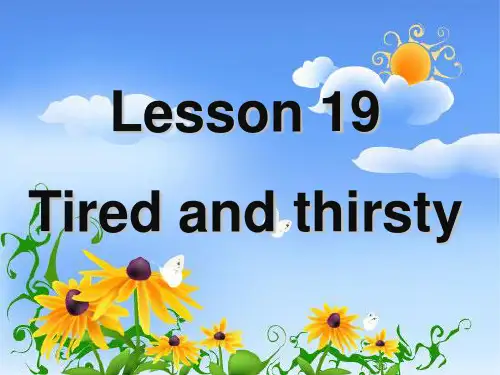
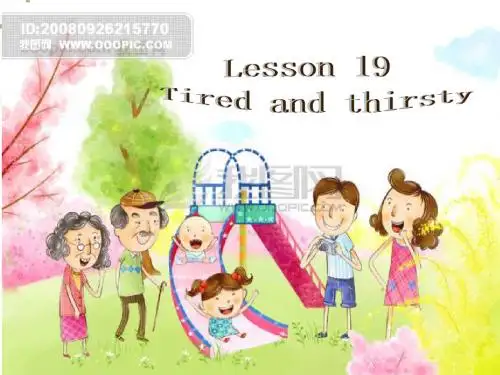
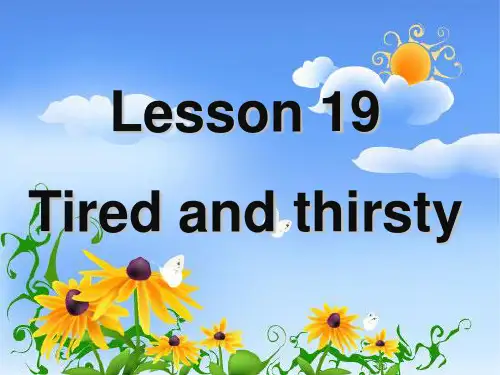
新概念英语第一册Lesson19~24课文详注【导语】新概念英语之所以经久不衰是因为以其全新的教学理念,有趣的课文内容和全面的技能训练,为英语学习者排忧解难,深受广大英语学习者的欢迎和喜爱。
想要学好英语的你,怎能错过?快来加入学习吧!小编为您提供了以下内容,希望能够为大家学习新概念英语提供帮助!新概念英语第一册Lesson19~20课文详注1.What's the matter?怎么啦?相当于 What's wrong?或 Tell me what's wrong。
这个句型通常用来询问发生了什么事。
假如要特别提及某人,可以在后面加上介词with,如:What's the matter with you?你怎么啦?What's the matter with Claire?克莱尔怎么啦?2.Mum,儿语中小孩子对母亲的称呼。
与此相似,dad是对父亲的儿语称呼。
3.There's = There is。
它表示"有"、"存在",为 there + be结构的一般现在时缩略形式。
4.Two ice creams please.请拿两份冰淇淋。
相当于 Give us two ice creams,please。
请参见第3-4课_Sorry,sir.课文注释。
ice cream是物质名词。
物质名词前加不定冠词 a或基数词表示一种、一份、一客、一类、一阵等。
新概念英语第一册Lesson21~22课文详注1.Give me a book please, Jane.请拿本书给我,简。
这是一个祈使句。
祈使句表示请求或命令。
(请参见第13-14课_A new dress语法部分的说明。
)表示客气的请求时,通常加please。
2.Which book? 哪一本?是Which book do you want?的省略形式。
下文中的This one? 是Do you wantthis one?的省略形式。
新概念英语第一册第19课内容新概念英语第一册第19课内容Listentothetapethenanswerthisquestion.Whydothechildrent hanktheirmother?听录音,然后回答问题。
为什么孩子们向母亲致谢?What’sthematter,children?母亲:怎么啦,孩子们?Wearetired女孩:我们累了……andthirsty,Mum.男孩:……口也渴,妈妈。
Sitdownhere.母亲:坐在这儿吧。
Areyouallrightnow?母亲:你们现在好些了吗?No,wearen’t.男孩:不,还没有。
Look!There’sanicecreamman.母亲:瞧!有个卖冰淇淋的。
Twoicecreamsplease.母亲:请拿两份冰淇淋。
Hereyouare,children.母亲:拿着,孩子们。
Thanks,Mum.孩子们:谢谢,妈妈。
Theseicecreamsarenice.女孩:这些冰淇淋真好吃。
Areyouallrightnow?母亲:你们现在好了吗?Yes,weare,thankyou.孩子们:是的',现在好了,谢谢您! NewWordandexpressions生词和短语mattern.事情childrenn.孩子们(child的复数)tiredadj.累,疲乏boyn.男孩thirstyadj.渴Mumn.妈妈(儿语)sitdown坐下rightadj.好,可以icecream冰淇淋Notesonthetext课文注释1What'sthematter?=Tellmewhat'swrong.怎么啦? 2There's=Thereis.。
综合英语・Comprehensive English新概念英语1 ・New Concept English1Lesson 19【New Words and Expressions】∙ 1. matter ['mætə] n. 事情∙例句:∙1)It was a matter of life and death for them.这事对他们来说是生死攸关。
∙2)It was clear that she wanted to discuss some private matter.很明显,她想谈些私事。
∙ 2. children ['tʃildrən] n. 孩子们(child 的复数)∙例句:∙1)She always spoke kindly to the children.她总是亲切地和孩子们说话。
∙2)Children need a happy home environment.孩子需要一个幸福的家庭环境。
∙ 3. tired ['taiəd] adj. 累,疲乏∙例句:∙1)I was tired after shoveling snow all day.铲了一天的雪我很累了。
∙2)Michael is tired and he has to rest after his long trip.迈克尔累了,他在长途旅行以后必须休息。
∙ 4. boy [bɔi] n. 男孩∙例句:∙1)Don't cry. You're a big boy now.别哭啦,你已是个大孩子了。
∙2)I knew him when he was a little boy.他还是个小男孩的时候我就认识他了。
∙ 5. thirsty ['θə:sti] adj. 渴∙例句:∙1)Salty food makes you thirsty.吃咸的食品会令你口渴。
∙2)Drink whenever you feel thirsty during exercise.运动过程中渴了就喝点水。
新概念英语第一册笔记新版:第19课If someone has deceived you, don't get angry with him, because everybody wants to make a living. And the way of life is so narrow that you cannot but run into others.It's nearly the end of the last year, most of us have the habits to recollect what happened in the last year:something good, something bad, something sad, something happy … But no matter what happened, I think, the best choice for everybody is try to be happy.Lesson 55 The Sawyer family[词汇]live v. 住,生活stay v. 呆在,停留Home n. 家;adv. 到家housework n. 家务lunch n. 午饭afternoon n. 下午usually adv. 通常together adv. 一起evening n. 晚上arrive v. 到达night n. 夜间live in(at)stay at Homedo the houseworkdo one's Homeworkhave lunch, eat one's lunch in the afternoonat nighttell 告诉mince 肉馅chicken 鸡肉butcher 屠夫meat 肉husband 丈夫beefsteak 牛排beef 牛肉truth 实情,真话together 一起usually 通常grape 葡萄peach 桃子tomato 西红柿potato 土豆lettuce 莴苣cabbage 白菜wardrobe 衣柜checkroom 衣帽存放处nationality 国籍refrigerator 冰箱electric 电的Home 家house 房子living room 客厅bedroom 卧室kitchen 厨房garden 花园town 城镇village 村庄country 乡下;国家in the afternoon 在下午housework 家务Homework 家庭作业at night 在夜间arrive 到达evening 傍晚,晚间night 夜间too 肯定句中表示“也”either 否定句和疑问句中表示“也”do one's Homework:做… 的家庭作业do the housework:做家务in the eveningat night[词汇·略]live:长期居住在…;短期住dwell:合法居住inhabit:世世代代居住在reside:(正式用语)居住在… [ri5zaid]live in/live atMy uncle lives in Paris.The Sawyers live at 87 King Street.Where do they live? /Where does she(he) live? Where do the student live?live(a.)live show:现场演出make a living:谋生live for:为… 而活着stay at Home:呆在家Homeless:无家可归Homesick:思乡的Hometown:家乡Homely:家常的Homeland:祖国Homemade:自制的Home alone:独自在家here, there, Home, upstairs, downstairs, downtown, abroad 这些地点副词前面不能加介词do one's housework [一般不用] do the houseworkbreakfast:早餐supper:晚餐dinner:正餐,宴会meal:一顿饭three meals a dayin the eveningarrive in/ atat nightlive in/at:居住go to work:去上班go to school:去上学take sb. to somewhere:带某人去……stay at Home 呆在家里do the housework 做家务eat/have one's lunch:吃……的午餐see one's friends:拜访……的朋友drink tea together:一起喝茶come Home from school:从学校回家come Home from work:下班回家arrive Home 到家do one's Homework:做……的家庭作业go to bed:上床睡觉read one's newspaper:读报纸watch TV:看电视[提示]when, where, when, whoWhere do the Sawyers live?They live at eight-seven King Street.What does Mr. Sawyer usually do in the morning?Mr. Sawyer goes to work in the morning. What do the children do in the morning? They go to school.Who takes them every day?Their father. Mr. Sawyer.Mr. Sawyer takes them to school every day. What does Mrs. Sawyer do in the morning? Mrs. Sawyer usually stays at Home.What does she do?She does the Homework.When does Mrs. Sawyer eat her lunch?At noon.What does Mrs. Sawyer do at noon?Eats her lunch.When does Mrs. Sawyer see her friends?In the afternoon.Usually what do they do together?They usually drink tea together.When does Mr. Sawyer come Home from work? In the evening.Does he arrive Home very early?No, he doesn't come Home very early.Do they come Home from school very early?Yes, the children arrive Home very early.What do the children do at night?They usually do their Homework.Then what do they do?They go to bed.What about Mr. Sawyer?Mr. Sawyer usually reads his newspaper.Sometimes he and his wife watch television.[课文]The Sawyer live at 87 King Street.In the morning, Mr. Sawyer goes to work and the children go to school.Their father takes them to school every day.Mrs. Sawyer stays at Home every day. She does the housework.She always eats her lunch at noon.In the afternoon, she usually sees her friends. They often drink tea together/in the garden.In the evening, the children come Home from school. They arrive Home early.Mr. Sawyer comes Home from work. He arrives Home late.At night, the children always do their Homework. Thenthey go to bed. Mr. Sawyer usually reads his newspaper, but sometimes he and his wife watch television.live at, go to work, go to school, take to, stay at home, do the housework, eat one's lunch, see one's friends, drinktea together, come home from school, arrive home, come home from work, do one's Homework, go to bed, read one's newspaper, watch TV重点:一般现在时及动词的熟练使用。
新概念英语笔记第一册
Lesson 19 Tired and thirty
[词汇](9)
matter n. 事情
children n. 孩子们(child 的复数)
tired adj. 累,疲乏
boy n. 男孩
thirsty adj. 渴
Mum n. 妈妈
sit down 坐下
right adj. 好,可以
ice cream 冰淇淋(有时可数,有时不可数)
★matter n. 事情
①n. 事情,事件
It’s a private matter.
He’s not very interested in financial matters.
②n. 麻烦事,困难
What's the matter? =Tell me what’s wrong? =What’s wrong?
What’s the matter with+sb.
What's the matter with the children?
It doesn't matter. 没关系
It matters. 有关系
Does it matter? 有关系吗?可以吗?
★thirsty adj. 渴
①adj. 渴的,口干的
②adj. (工地等)干旱的
a dry and thirsty land 干旱的土地
③adj. 渴望的,渴求的(for / after)
The students there are thirsty for knowledge.
那里的学生有强烈的求知欲。
[语法]
There be 句型
there be 句型:表示某处有某物
there is + 可数名词的单数/不可数名词
There is a pen, two books and a knife on the desk.
课桌上有一枝钢笔、两本书和一把小刀。
(第一个并列名词是单数,所以用is)there are + 可数名词的复数形式
常见方位介词:in、on、over、under
on:在…上面,接触物体表面
over:越过,垂直上方,不接触表面
in:在…里面,物体里面
to:往,向,表示去向方向
into:进入…里面,从外到里进入的过程
out of:在…外,从里面出来
across:横穿[在物体表面横穿],从平面穿过
through:从里面(中间)穿过
under:在……下面
deside:在……旁边
near:在……附近
between:在……两者之间
among 在…中间(两者以上)
over:从斜面穿过
介词用法:
1、跟在be动词之后
2、
3、跟在一些不及物动词之后。